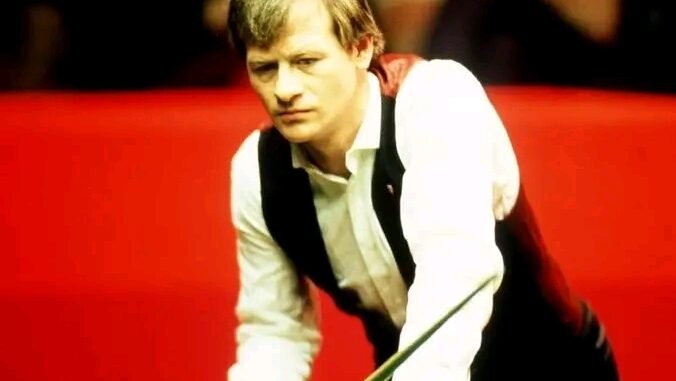
When Alex Higgins declared, “I played snooker the way I lived my life — fast, reckless, and without regret,” it was more than a line. It was the essence of the man. For some, those words sounded like a confession. For others, they were freedom itself. And for the world of snooker, they were the storm warning of a career that would change the sport forever.
Higgins was no neat technician, no quiet gentleman of the green baize. He was fire wrapped in flesh, a hurricane in human form. Where others brought order, he brought chaos. Where others prized calm precision, Higgins unleashed speed, flair, and unpredictability. He smoked between frames, argued with referees, clashed with opponents, and lived every day as though tomorrow was not promised — because, for him, it never truly was.
The Rise of the Hurricane
Born in Belfast in 1949, Higgins carried with him the spirit of a city that knew turbulence. His game reflected his roots: raw, fearless, and unpolished, yet electrifying. When he burst onto the snooker scene in the early 1970s, the sport was a slower, more restrained affair. Higgins tore through that restraint.
At just 22 years old, he captured the 1972 World Championship. It wasn’t just a win — it was a statement. Snooker, once viewed as a pastime for quiet halls and polite applause, suddenly had a rock star. Higgins played like a man sprinting against time. His quick-fire breaks and audacious shots made him a crowd favorite, but it was his emotional transparency — his tears, his rages, his unfiltered humanity — that made him unforgettable.
Flawed Genius
Greatness often wears the mask of discipline, but Higgins proved it could arrive cloaked in chaos. He was unpredictable, often self-destructive, and his lifestyle off the table mirrored his approach on it. Alcohol, cigarettes, and turbulent relationships followed him everywhere.
Yet even in his darkest moments, his genius remained. Higgins was never simply potting balls; he was performing theatre. Every match was drama, every victory a catharsis, every defeat a tragedy. He wore his heart on his sleeve in a way that few athletes ever dared. His tears after winning the 1982 World Championship — as he embraced his baby daughter on live television — became one of the most iconic moments in snooker history. It was not just sport. It was life, raw and unfiltered, laid bare for millions to see.
A Man Who Made Snooker Feel Alive
For Higgins, snooker wasn’t about perfection. It was about passion. Where many of his contemporaries built careers on calculated precision, Higgins played on instinct, on impulse, on emotion. His unpredictability wasn’t just tolerated by fans — it was adored. He was human, fragile, flawed, and that humanity made him magnetic.
Crowds flocked not simply to see Higgins win, but to feel what he felt. His anger, his joy, his frustration — it was all theirs too. In a game often criticized for being too measured, too still, Higgins injected heartbeats, sweat, and fire. He reminded everyone that sport is not just numbers and technique; it is also a story of the human soul, with all its messiness intact.
Legacy of Emotion
When Higgins passed away in 2010 at the age of 61, the snooker world mourned more than just a champion. They mourned a reminder that sport is about life in its fullest, most chaotic expression. He left behind a record that included two World Championships and a reputation as one of the greatest shot-makers the game has ever known. But statistics cannot capture what Higgins gave to snooker.
He gave it emotion. He gave it unpredictability. He gave it humanity. For every child who picked up a cue dreaming of flair over discipline, Higgins was the blueprint. For every fan who wanted to feel the highs and lows of life reflected on the table, Higgins was the mirror.
The Lesson of a Hurricane
Higgins’ life was not tidy. His career was marked by brilliance and breakdown, by triumph and scandal. But perhaps that is why he remains so beloved. In him, people saw themselves — imperfect, battling demons, yet capable of moments of staggering beauty.
The lesson he left is clear: greatness does not always come in neat packages. Sometimes it arrives wild and unpredictable, like a storm that rattles the windows and shakes the foundations. Higgins was such a storm. And though storms are fleeting, they are unforgettable.
A Human Story Above All
Alex Higgins’ story is ultimately not just about snooker. It is about being human. About the fragility of life, the weight of demons, and the beauty of refusing to regret. His tears after triumph, his fury after failure, his refusal to hide his flaws — all of it was a reminder that sport is not just spectacle, but life lived out loud.
When the Hurricane blew himself out in 2010, the game lost more than a champion. It lost a reminder that life itself is short, messy, and beautiful precisely because it refuses to be tidy.
Higgins may be gone, but every time a player takes a shot with abandon, every time a crowd cheers not just for the score but for the spirit, his presence lingers. Fast. Reckless. Without regret. That was Alex Higgins — and that is why the Hurricane will never truly died
Leave a Reply